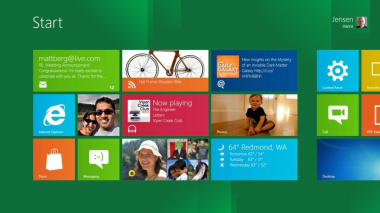Microsoft Delivers Second Solid Quarter in a Row
Microsoft reported its second decent quarter in a row, to meet analysts’ expectations for the first three months of its fiscal year.

Profits rose 6 percent on a revenue increase of 7 percent, compared to the same period a year earlier.
Microsoft reported a profit of $5.74 billion, or 68 cents a share, compared with $5.4 billion, or 62 cents a share in the first quarter 2010. Revenues totaled $17.37 billion, up from $16.2 billion.
Microsoft met expectations of analysts, who were expecting a profit of 68 cents, and exceeded their revenue expectations of $17.24 billion.
Still, investors may have been looking for more. The company’s stock was down 32 cents or 1.2 percent in after-hours trading, to $26.72 a share.
In a release, the company pointed to particularly strong sales for Office, SharePoint, Exchange and other cloud services such as Office 365 and Windows Azure, but stayed mum on the company’s weaker areas, such as Windows Phone.
I’ll be standing in for our very own Kara Swisher today to liveblog the call at 2:30 pm PT.
To be discussed are some of the more cheery highlights, such as the official close of the Skype acquisition; Xbox’s dominance in outselling every other console for 15 of the past 16 months in the U.S., and how gosh-darn pretty the upcoming Windows 8 home screen is.
And everyone will want to know about the rumors — about Microsoft mulling a bid for Yahoo — that resurfaced again yesterday.
Live coverage of the call will kick off shortly.
2:58 pm: Joining the call after some technical issues. The Q&A is in progress. A question from Citibank: As you look at the OSD, losses are sustainable. How are you thinking about lower losses?
Bill Koefoed, general manager of investor relations: By far the most important thing is to grow the revenue for search up. We have people working closely with Yahoo on that. That is the most leveraged thing we can do for OSD profitability.
A question from Credit Suisse: Focusing on MBD, you’ve been trending. Where do we stand in the adoption cycle of Office 2010?
Koefoed: There’s a few things going on in the enterprise. One is the great traction we get from integration of SharePoint and Exchange and Lync. Good traction. Second is the cloud. When we talk to enterprises about productivity, they want to talk about cloud services. They want to understand where that is leading. That creates an incredibly good conversation. I think obviously that is a long-term phenomenon with a lot of room to grow.
3:04 pm: A question from UBS on the enterprise: Any change in customer behavior? There has been some concern about larger deal sizes.
Koefoed: No changes.
Peter Klein, CFO: We continue to execute well on the annuity side.
Question from Bernstein Research. Asking about hosting. How much do you think Office 365 and SharePoint have gained traction?
Answer: Delivering as a service should have a higher gross profit dollar.
3:07 pm: Question from VGC Financial. Can you update us on the percentage of cash offshore?
Klein: $51 billion is offshore.
A question from Oppenheimer, asking about Xbox Live business: Are there opportunities for additional premium service contracts?
Klein: Without being specific, from a business model there are lots of opportunities to deliver unique and compelling entertainment experiences. That has been the thinking all along.
Koefoed: Xbox Live has been phenomenal in growth, in users and revenue. We’re going to have 70 games out this holiday season. We believe we have the most compelling entertainment experience in the living room.
3:10 pm: Question from CLSA: What are your assumptions for royalties around mobile phones, given the deal with Samsung?
Klein: We haven’t announced any particular details around the deal.
Question from Stifel Nicolaus about business PCs: Where do you think we are in the Windows 7 upgrade cycle?
Klein: Middle innings. Through the fiscal year, at least.
One more question: Wells Fargo asking about what happens to Microsoft’s tie-ups with Yahoo if Yahoo gets acquired.
Klein: We have a great relationship with Yahoo. It’s a long-term relationship, and the teams are super focused on getting things done there.
And that is the end of the conference call.








